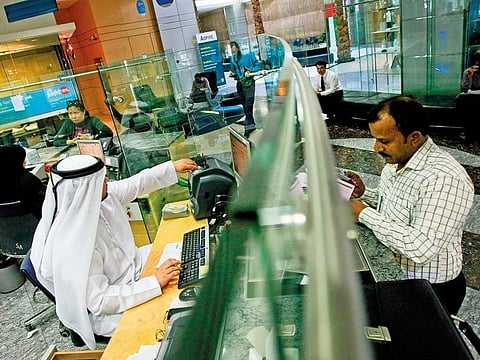UAE banks score low on customer satisfaction: KPMG survey
Debit and credit cards, and loan solutions registered the highest negative net sentiment

Dubai: Banks in the UAE have scored low on customer satisfaction, a new survey revealed on Tuesday.
Operational issues, lack of timely support by bank staff, long wait times and lack of feedback were the most common issues, it added.
The UAE Banking Sentiment Index by KPMG and DataEQ is based on 172,588 retrieved public tweets from January 1 to December 31, 2021. Service disruption was also a major challenge across the industry as consumers were unable to use banks’ mobile apps and complained of issues using online banking services.
The study also found that a third of all online conversations about banks required a response. However, on average 69 per cent of priority tweets received a public response, leaving 31 per cent of tweets unanswered. On a positive note, the average time it took the banks to respond was 10 hours, which was an improvement from the response time of 13 hours reported in the 2021 study.
In support of using online platforms for banking services, DataEQ’s CEO Nic Ray said: “With customers increasingly preferring to use digital channels for engagement with their bank, there is an opportunity to mine this valuable unstructured feedback for real-time insight, and importantly, an obligation to deliver effective, fair and compliant customer service on these channels.”
Debit cards, credit cards, and loan solutions had the highest negative net sentiment. In addition to complaints about fees related to these products, some consumers were frustrated by slow delivery of issued cards and delayed activations. There were also frequent complaints of the debit cards not working without a previous warning.
Despite these shortcomings, the UAE banking sector registered a promising year, with the top 10 UAE banks reporting a 5 per cent year-on-year increase in total assets to Dh2,989 billion in 2021, and a large increase of 42 per cent in their net profits.
Abbas Basrai, Partner and Head of Financial Services, KPMG Lower Gulf, said: “It isn’t enough to invest in digitalisation. Banks must rely on a data-driven approach which will results in better accuracy, optimised operations, improved compliance and an enhanced customer experience. Banks must evaluate their responsiveness to priority conversations on social media and make it part of their wider customer care strategy – rather than relying on it as a marketing tool.”
Credit products in high demand
Consumers mostly inquired about the requirements and application process for loans, particularly for personal loans. Business banking was also in high demand across the industry. Receiving the most interest in this regard was Abu Dhabi Commercial Bank, followed by Emirates NBD, as consumers inquired about opening business accounts with both banks. From a churn perspective, the products most likely to drive cancellation threats were credit and debit cards, followed by loans and credit solutions.
ADIB leads the pack
Out of the seven banks analysed, Abu Dhabi Islamic Bank had the largest share of voice on social media throughout the year, followed by Emirates NBD. The other banks in the survey include Abu Dhabi Commercial Bank, Commercial Bank of Dubai, Dubai Islamic Bank, First Abu Dhabi Bank, and Mashreq Bank UAE.
In addition to having the largest share of voice, Abu Dhabi Islamic Bank topped the ranking in terms of net sentiment. While all banks scored negatively in overall net sentiment, the variation in negative scores was quite significant, with top performer ADIB achieving a score 23.9 percentage points higher than the worst performing bank.
ADCB stays consistent
Despite missing out on the top spot in overall net sentiment, Abu Dhabi Commercial Bank recorded the highest operational net sentiment throughout the year. After reaching the lowest point in the second quarter, the bank saw consistent improvement in net sentiment throughout the year. Consumers expressed they favoured ADCB over other banks, praising customer service and staff conduct.







